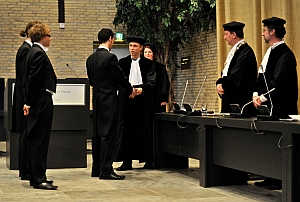Lieven Brebels successfully defended his Ph.D. 'Mirror, mirror on the wall ... procedural fairness as an evaluative and regulatory looking-glass self' on Friday, February 27
 On Friday February 27, 2009, Lieven Brebels defended his dissertation Mirror, mirror on the wall ... procedural fairness as an evaluative and regulatory looking-glass self at Tilburg University. His supervisors were Profs. David De Cremer, Constantine Sedikides and Patrick Kenis.
On Friday February 27, 2009, Lieven Brebels defended his dissertation Mirror, mirror on the wall ... procedural fairness as an evaluative and regulatory looking-glass self at Tilburg University. His supervisors were Profs. David De Cremer, Constantine Sedikides and Patrick Kenis.
In his dissertation, Lieven Brebels focuses on how injustice translates into action. In examining the roles of self- and motivational processes, his major aim was to gain a deeper understanding why and when people’s reactions to matters of procedural injustice lead to specific behavioural reactions (revenge or prosocial behaviour, like helping and cooperation). He did so through experimental research and questionnaires among Dutch speakers.
Dishonesty leads to losses
One of Brebel’s findings is that dishonesty causes mutual losses. For example, he let a group of test persons negotiate the division of an amount of money with a superior (X), with whom they had already dealt at an earlier encounter. On the basis of this earlier meeting, they had made an evaluation of X’s honesty or dishonesty. During the negotiation, the test persons had to make a bid with X, but X would always make the final decision. He could accept or reject the bid. The result was that when X was considered dishonest, test persons would offer him part of the money, but they would keep the largest part for themselves. This way, they expected to achieve a more profitable result for themselves. But the less they offered X, the greater the chance the deal would fail. Thus, dishonesty causes losses at both sides.
‘Who truly wants to accomplish something needs honesty’, argues Brebels. ‘Only then mutual benefits can be achieved.’ In this way, joint decision making as an example of an honest procedure, can imbue people with the feeling they matter, that they are part of a larger whole to which they can make a valuable contribution. In turn, this leads to extras that cannot be expressed in numbers, such as taking pride in representing the group, helping newcomers, and extra efforts.
Relevance with regard to the current economic crisis
Brebel’s results are also relevant with regard to the current economic crisis. ‘From the way they are treated, people deduce how they are viewed by banks and companies. This treatment functions as a figurative mirror’, according to Brebels. The reflection determines the way people see themselves, their self-image. It also influences their behaviour. They repay honesty with constructive behaviour, while dishonesty leads to destructive behaviour in the form of revenge. ‘People want to be taken seriously’, argues to Brebels. ‘When banks and companies take decisions in an unfair manner, customers will want to take revenge. They are less understanding, and less hesitant to go to the competitor.’
It appears revenge often springs from the will to win. In turn, this attitude is related to matters concerning self-image, such as status and reputation. But when people act from this vindictive attitude, they are more prone to take risks and to make unwise financial decisions. Living beyond one’s means by buying a too expensive car is an example. This is because avenging oneself is aimed at achieving a fast victory, not on sustainability. In the end, Brebels shows, this behaviour leads to losses at both sides. Not only do banks and companies lose their clientele, but the customers themselves also run into difficulties.

